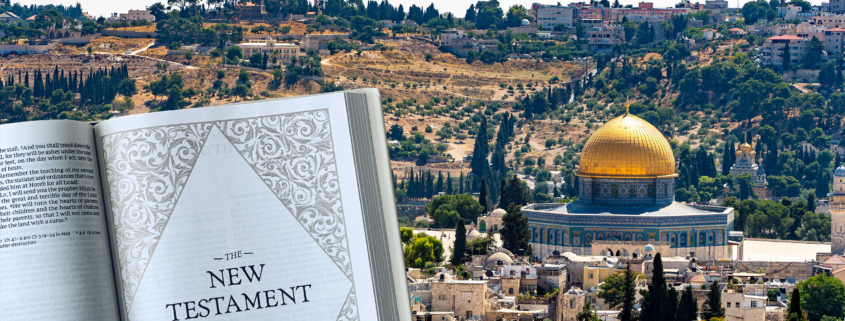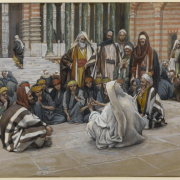What Does the New Testament Say About Supporting Israel?
Ever since its declaration of independence in 1948, the State of Israel has been under attack from forces who desire her destruction. Jewish people from within Israel and the Diaspora have been the primary supporters of Israel’s cause since that time. Surprisingly, however, Gentile Christians have also been staunch defenders of Israel, and they have cited the New Testament as support for their Zionism. Accordingly, Messianic Jews—some of whom are Israelis—are united in their support of the Jewish homeland. What would motivate believers in Jesus, both Messianic Jews and non-Jews, to have religious reasons for supporting the State of Israel?
The New Testament Affirms the Chosenness of the Jewish People
The New Testament includes an entire hope-filled chapter about God’s love and faithfulness toward Israel, the Jewish people: Romans chapter 11. This passage, written by the apostle Paul, is delivered in the style of the Hebrew Prophets. Paul, claiming divine revelation from God, spoke about the prophesied future of the Jewish people in remarkably warm and hopeful terms. Writing around 55 CE, Paul acknowledged that many of his Jewish brothers and sisters had rejected Jesus as the Messiah, which was grounds for Paul’s deep discomfort and concern (Rom 9:1—5). Despite this sorrow, he emphatically denied God’s rejection of the Jewish people (Romans 11:1) and instead emphasized their continued status as God’s chosen and beloved people.
In Romans 11:28–29, Paul made the strongest statement in the New Testament about the Jewish people’s continued “election” or “chosenness” by God. He wrote,
But as regards election, they are beloved for the sake of their forefathers.
For the gifts and the calling of God are irrevocable.
Romans 11:28–29
This emphatic statement leaves no room for a Jesus-follower to deny the continued chosenness of the Jewish people. Whether or not they believe in Yeshua as the Messiah, Jewish people remain chosen and beloved by God because of their covenantal descent from Abraham, Isaac, and Jacob. Their chosenness was bestowed upon them by God through their forefathers, and his divine gift is irrevocable.
These verses, tragically, were glossed over by many Christians in the past, but that has changed. Because of this bedrock truth about the Jewish people, many contemporary Christians and Messianic Jews know that they must support the continued existence, survival, and dignity of the Jewish people. How can they spitefully oppose the people whom God has chosen as beloved? Would they oppose God himself?
No, instead of rejecting a people whom God has not rejected (Rom 11:1), faithful followers of Jesus have become Israel’s greatest friends in the world. They see their support of Israel as a natural outworking of the New Testament’s affirmation of the continued place of the Jewish people in God’s eyes. In addition, they see support of Israel as teshuvah for centuries of Christians ignoring the dignity and chosenness of the Jewish people as reflected in Romans 11.
The New Testament Affirms the Future Restoration of Jerusalem as a Jewish State
Not only does the New Testament affirm the present-day chosenness of the Jewish people, but it also affirms the Jewish people’s glorious future as promised by the Hebrew Prophets.
After Yeshua’s resurrection from the dead, his disciples crowded around him with eager expectation about what would come next. A core Jewish belief about the Olam HaBa (World to Come) would be that it would begin with the resurrection of the dead and would result in a restored Davidic kingdom in Jerusalem. Yeshua, of David’s kingly line, had just risen from the dead—would the restoration of the kingdom come directly afterward? Here is what the disciples asked Yeshua, and his answer:
So when they had come together, they asked him, “Lord, will you at this time restore the kingdom to Israel?” He [Jesus] said to them, “It is not for you to know times or seasons that the Father has fixed by his own authority.” (Acts 1:6–7)
After this remark, Jesus moved on to other matters. Let’s note how Jesus answered the disciples’ question. He did not say when the kingdom would be restored to Israel, but he affirmed that there was a fixed (prophesied) time set by God for such a restoration to happen. In other words, he told his disciples, “Just wait!”
Some weeks later, the apostle Peter was preaching about Jesus to his fellow Jewish people, and he indicated the time when such a restoration would occur. He asked his fellow Jews to repent of their sins such “that [God] may send the Messiah appointed for you, Jesus, whom heaven must receive until the time for restoring all the things about which God spoke by the mouth of his holy prophets long ago” (Acts 3:20–21). In this remark, Peter affirmed the many prophetic passages of the Hebrew Scriptures where Israel is restored to her land, with a Davidic king reigning on her throne, and God living in her midst (Deut 30:1–6; Eze 36—37; Zech 14). All these prophecies of the Jewish people’s glorious future will be fulfilled when Jesus returns!
If God will restore Israel in her land in the future, according to the New Testament, then why oppose Israel in her land today? Rather, it should be the other way around: Christians and Messianic Jews should support Israel’s return to her land specifically because it is a prelude to the great prophesied restoration!
Support For Israel as a New Testament Imperative
The modern project of the State of Israel is not religious in nature. It is not the Messianic kingdom as prophesied in the Scriptures. However, it represents a historic and prophetic return of the Jewish people to her covenanted land, and the state’s continued existence is essential for the survival of the Jewish people. To oppose the existence of the State of Israel is to oppose the self-determination, dignity, and self-defense of the Jewish people, whom God dearly loves.
The New Testament includes teachings about the present-day chosenness and the future restoration of the Jewish people. To oppose the Jewish people’s right to survival—as exemplified by their self-determination in the Holy Land—is to undermine the New Testament’s teachings about the Jewish people’s past, present, and future. For these reasons, and many more, Jewish and Gentile followers of Jesus find a religious imperative for their support of Israel and Jewish people worldwide.


 Public Domain
Public Domain




